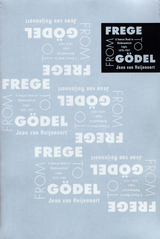

The fundamental texts of the great classical period in modern logic, some of them never before available in English translation, are here gathered together for the first time. Modern logic, heralded by Leibniz, may be said to have been initiated by Boole, De Morgan, and Jevons, but it was the publication in 1879 of Gottlob Frege’s Begriffsschrift that opened a great epoch in the history of logic by presenting, in full-fledged form, the propositional calculus and quantification theory.
Frege’s book, translated in its entirety, begins the present volume. The emergence of two new fields, set theory and foundations of mathematics, on the borders of logic, mathematics, and philosophy, is depicted by the texts that follow. Peano and Dedekind illustrate the trend that led to Principia Mathematica. Burali-Forti, Cantor, Russell, Richard, and König mark the appearance of the modern paradoxes. Hilbert, Russell, and Zermelo show various ways of overcoming these paradoxes and initiate, respectively, proof theory, the theory of types, and axiomatic set theory. Skolem generalizes Löwenheim’s theorem, and he and Fraenkel amend Zermelo’s axiomatization of set theory, while von Neumann offers a somewhat different system. The controversy between Hubert and Brouwer during the twenties is presented in papers of theirs and in others by Weyl, Bernays, Ackermann, and Kolmogorov. The volume concludes with papers by Herbrand and by Gödel, including the latter’s famous incompleteness paper.
Of the forty-five contributions here collected all but five are presented in extenso. Those not originally written in English have been translated with exemplary care and exactness; the translators are themselves mathematical logicians as well as skilled interpreters of sometimes obscure texts. Each paper is introduced by a note that sets it in perspective, explains its importance, and points out difficulties in interpretation. Editorial comments and footnotes are interpolated where needed, and an extensive bibliography is included.

This diary of the exiled Trotsky is a powerfully evocative fragment of history and human personality. Of all the great figures of the Russian revolution Leon Trotsky touches our senses as the one who lived, and felt, and died as other men. He breaks through, or is forced through the screen of dialectic and bombast that conceals his colleagues. Understandably, we feel curiosity about and some sympathy for the man who was driven out as he had driven others, who wandered the world in danger foreseeing assassination, and who was struck down by his enemies in his last sanctuary so close to us. His life as a fugitive is a single human tragedy and he is, simply, more interesting than the others.
This extremely personal record is no disappointment. Written in France and Norway, it gives the day-to-day reflections of a fallen leader, of one who had wielded power and was now in an exceptional position to observe it in the hands of others. Naturally there are penetrating comments here on local and international politics, often timeless in their relevance, but with them comes admission to the private world of the revolutionary intellectual. Here Trotsky lived with anguish, was beset by loneliness, and sustained himself by pride and fanaticism.
But his concern was not wholly with himself and the impersonalities of politics. He set down his continuing anxiety for the safety of his beloved son, Sergei, and of his first wife to whom he was still deeply attached. They were in Russia, their fate unknown to him. In extraordinarily moving and unaffected words, he wrote, too, of his tender, still youthful passion for his adored second wife, Natasha (Natalia Ivanovna Sedov), the wise and courageous companion of his fighting years, the loyal woman who accompanied him into exile.
Finally, and until now unknown, there is his Testament, written in Mexico in February 1940 near the close of his life. Knowing that death was near, from illness if not from Stalin’s agents, he envisaged the form it might take, restated his defiance of Stalin and his imperishable confidence in the triumph of the People, and once more affirmed his love for Natasha. At the end there is the discontinued and unexplained sentence, “In case we both die...”

READERS
Browse our collection.
PUBLISHERS
See BiblioVault's publisher services.
STUDENT SERVICES
Files for college accessibility offices.
UChicago Accessibility Resources
home | accessibility | search | about | contact us
BiblioVault ® 2001 - 2024
The University of Chicago Press









